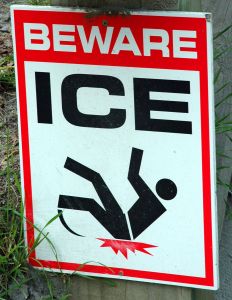Posted in Negligence,Tennessee Accident Law on June 13, 2014
In Tennessee, owners of land have a duty to maintain their property in a reasonably safe manner. This includes not just to invited guests, but also to people who may find themselves on the owner’s land by use of the public sidewalk. Therefore, the owner’s duty extends to maintain reasonably safe sidewalks, even though technically the property may not belong to the owner.
 However, before a slip-and-fall accident victim can recover for his or her injuries, she must prove her case. In Tennessee that means showing the existence of five elements:
However, before a slip-and-fall accident victim can recover for his or her injuries, she must prove her case. In Tennessee that means showing the existence of five elements:
As a part of proving their case, the plaintiff must also prove that the accident was caused by a dangerous condition on the owner’s land and that the owner either caused the condition himself, or had actual or constructive knowledge that the condition existed. In a recent case in front of the Tennessee Court of Appeals, the plaintiff’s case was dismissed because the court held that the property owner did not create the dangerous condition and had no way of knowing that it existed.
Wolfe v. Felts
In the recent case, Wolfe v. Felts, the plaintiff slipped and fell while walking in the street in front of the defendant’s property. Evidently, the sidewalk in front of the plaintiff’s property was covered in ice because he had been running the sprinkler system. Rather than walk on the icy sidewalk, the plaintiff decided to walk in the street; however, the street was also icy and the plaintiff fell, injuring himself in the process.
The plaintiff claimed that the defendant failed to maintain a reasonably safe premises and sued the defendant. The defendant, in response, claimed that there was no way he could have known that the sprinkler system was running, because he rented the property out to tenants, and he had no knowledge of the sprinkler system’s winterization requirement. He also testified that when he went to investigate the sprinkler box, the box lid had been pried open and the knob had been turned to the “on” position unbeknownst to him.
The plaintiff argued that the defendant’s failure to properly winterize the sprinkler system amount to the defendant “causing” the dangerous condition. However, the court disagreed, finding that the defendant had no way of knowing that the dangerous condition existed and that the plaintiff failed to present evidence that showed the defendant “caused” the dangerous condition.
Have You Been Injured in a Tennessee Slip-and-Fall Accident?
If you have recently been injured in a Tennessee slip-and-fall accident, it may have been due to the negligence of the property owner in maintaining a safe premises. However, as the above case makes clear, proving all the required elements at trial can be difficult. It is best to have an experienced Tennessee personal injury attorney on your side to help you prove your case. At Matt Hardin Law, we have a team of dedicated slip-and-fall attorneys ready to speak with you about your case. Click here, or call 615-200-1111 to schedule a free initial consultation today.
See Related Blog Posts:
Plaintiff Wins Appeal of Tennessee Nursing Home Negligence Case Based on Understaffing, Nashville Injury Lawyer’s Blog, published May 21, 2014.
The Tort of Negligent Infliction of Emotional Distress in Tennessee, Nashville Injury Lawyer’s Blog, published June 3, 2014.